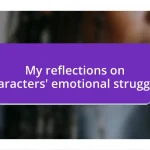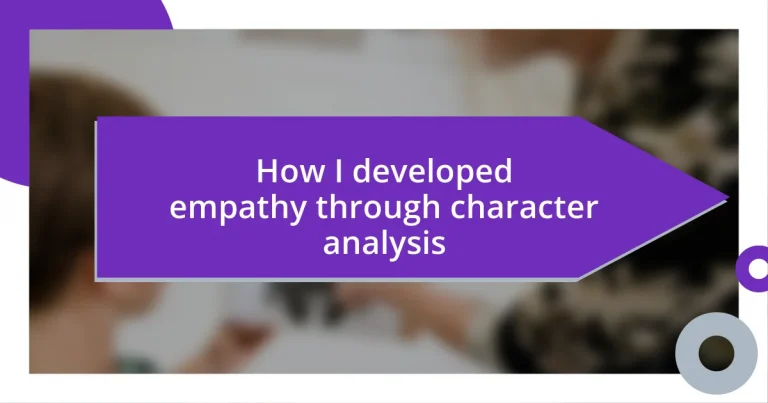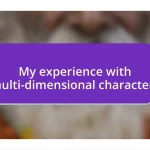Key takeaways:
- Empathy is crucial for fostering connections and reducing feelings of isolation, enriching personal relationships and promoting community well-being.
- Character analysis deepens empathy by allowing individuals to explore diverse human experiences, encouraging introspection and understanding of one’s own emotions.
- Application of insights from character analysis in real life enhances emotional intelligence and compassionate interactions, highlighting empathy as an ongoing practice rather than a static feeling.
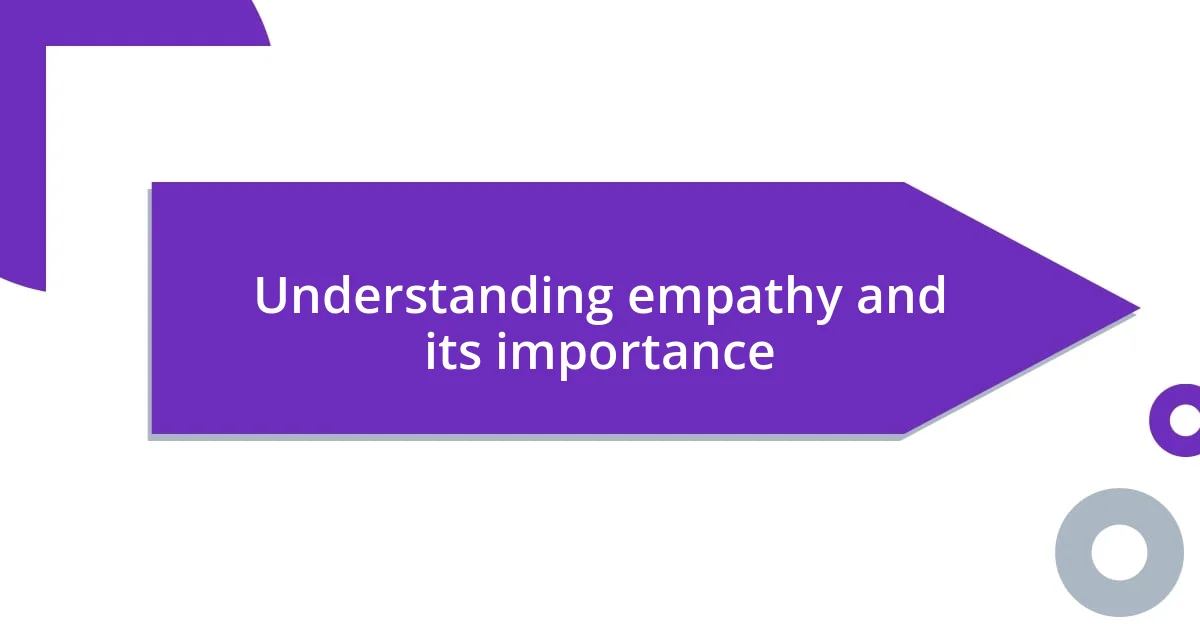
Understanding empathy and its importance
Empathy is the ability to understand and share the feelings of others, and its importance cannot be overstated. I remember a conversation I had with a friend going through a tough breakup. Instead of jumping straight to solutions, I listened and allowed myself to feel their pain. That moment opened my eyes to how much simply being present can mean to someone in distress.
Why does empathy matter? It fosters connection and reduces feelings of isolation. There was a time when I felt utterly alone in my struggles, but when someone reached out and genuinely tried to understand my experience, it changed everything for me. I realized that by practicing empathy, we can create environments where people feel valued and heard, ultimately leading to healthier relationships and stronger communities.
At its core, empathy encourages compassion, which can lead us to act in ways that uplift others. I’ve seen this firsthand when volunteering at a local shelter, where understanding the stories of those experiencing homelessness not only enriched my own life but also ignited a desire to advocate for meaningful change. Isn’t it amazing how a little empathy can ripple out and foster real positive change?
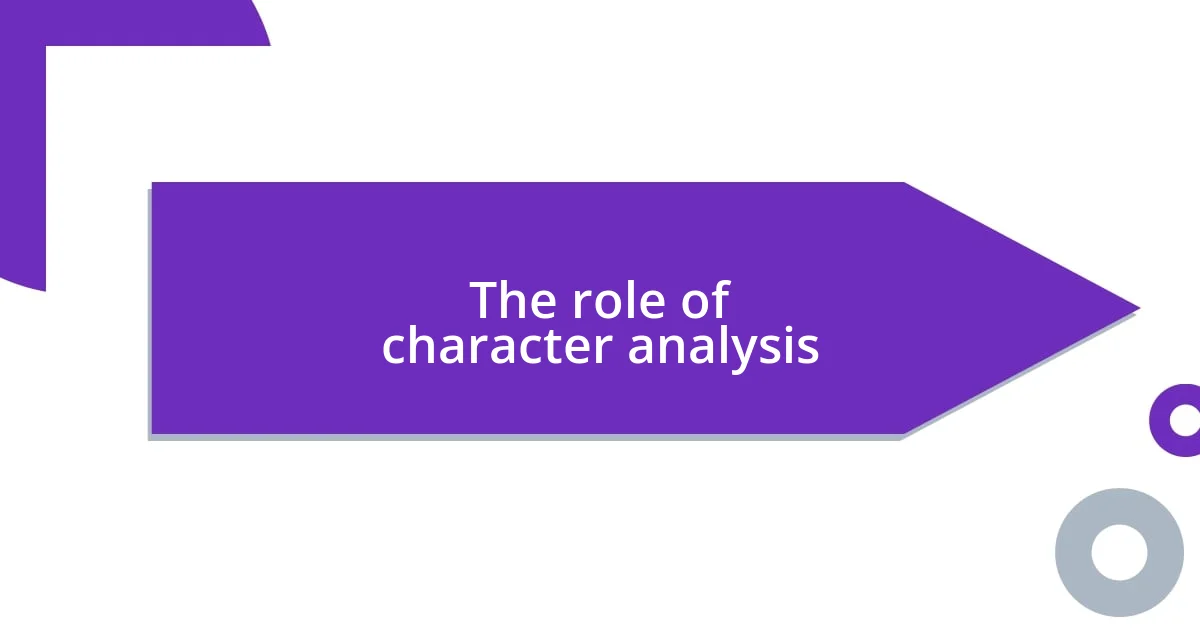
The role of character analysis
Character analysis plays a pivotal role in developing empathy. By delving into the lives and emotions of fictional characters, I’ve often found myself mirroring their struggles, fears, and triumphs in my own experiences. It’s almost like having a conversation with a friend; when I analyze a character’s choices, I become invested in their journey, and this emotional connection deepens my understanding of human behavior.
Reflecting on my time dissecting characters in literature, I can recall moments when their dilemmas felt eerily familiar. For instance, reading about a character who faced self-doubt allowed me to confront my own insecurities. It was as if their struggles illuminated my path, teaching me that vulnerability is a universal trait. The more I engaged with varied characters, the more I realized that empathy isn’t just about sympathy but understanding the complexity of diverse human experiences.
In my experience, character analysis doesn’t just foster a sense of connection; it evokes a broader perspective of life. When I explore the motivations behind a character’s actions, I not only engage with their story but also reflect on the world around me. This practice has taught me that we all carry our own narratives, filled with pain, joy, and resilience. How does one cultivate this understanding? Through the lens of character analysis, I believe we gain invaluable insights into our shared humanity.
| Aspect | Character Analysis |
|---|---|
| Emotional Connection | Deepens understanding through shared experiences |
| Personal Reflection | Encourages introspection and growth |
| Diversity of Experience | Highlight differences and similarities in human struggles |
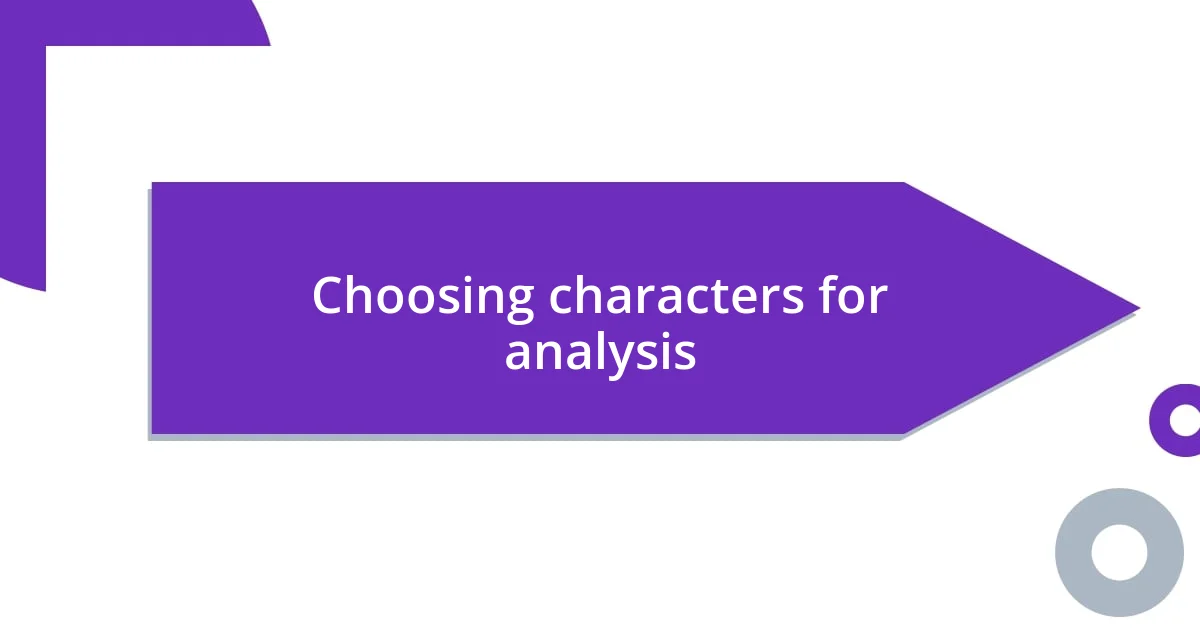
Choosing characters for analysis
Choosing the right characters for analysis can significantly impact my journey to developing empathy. I find that it’s vital to select individuals who showcase a wide range of emotions and circumstances. For instance, diving into complex characters who undergo intense moral dilemmas often yields richer insights. When I analyze a character who grapples with difficult decisions, I can relate their struggles to my own life situations. It’s those parallels that often resonate the most.
Here are a few criteria I consider when choosing characters for analysis:
- Relatability: Characters whose experiences mirror my own or challenge my perspectives.
- Complexity: Individuals with layered personalities and moral conflicts that spark deep reflection.
- Diversity: Embracing characters from various backgrounds, cultures, and life experiences to broaden my understanding.
- Change: Characters that undergo significant transformation, showing growth, failure, or redemption.
By thoughtfully selecting characters, I’ve noticed that my ability to empathize expands, revealing dimensions of human emotion I may have previously overlooked. Each character I choose becomes a tool for self-discovery, allowing me to explore feelings and thoughts that sometimes linger just beyond my conscious awareness. The more I dig into their stories, the more I unearth my own hidden narratives.
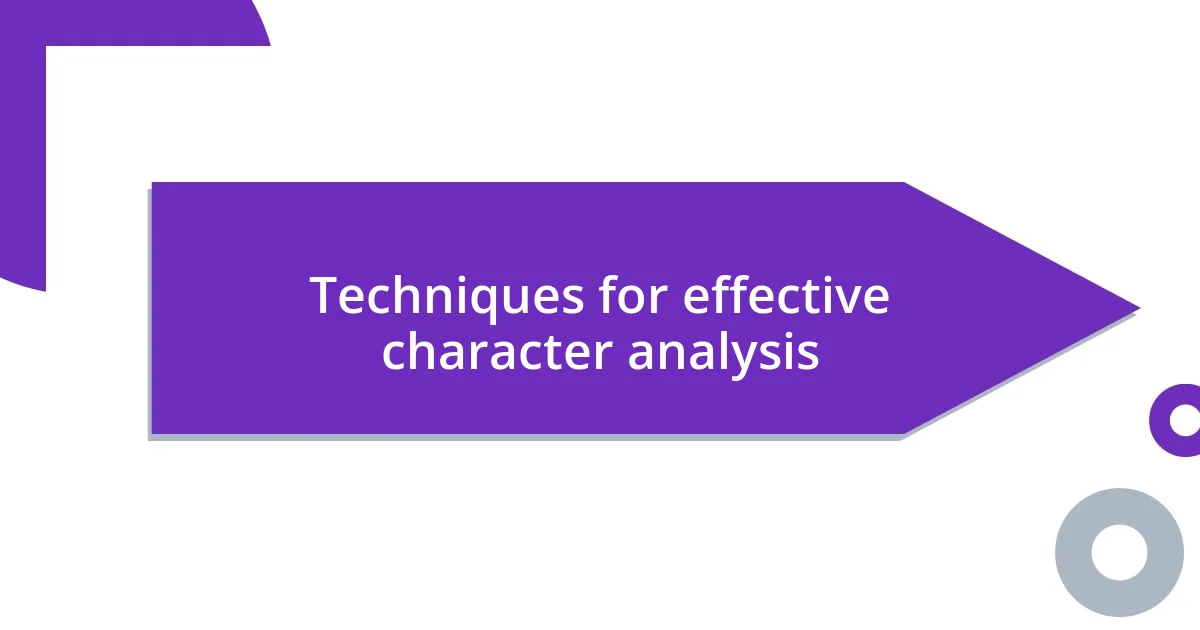
Techniques for effective character analysis
To conduct effective character analysis, I often start by immersing myself in the character’s environment. By visualizing their world, I gain insights into how their circumstances shape their actions and feelings. Have you ever read a novel and felt like you were right there in the character’s shoes? That sense of immersion can make you feel their pain or joy more deeply, transforming mere text into a vivid emotional experience.
I also find it incredibly valuable to engage with a character’s dialogue. What an individual chooses to say—and what they fail to articulate—often reveals their true essence. Reflecting on a character I once analyzed, I remember being struck by their silence in a critical moment; it hinted at deeper fears and regrets. It makes me wonder: how often do we hold back our emotions in real life? This technique invites me to consider not only character motivations but my own communication styles as well.
Lastly, I embrace the practice of connecting characters to broader themes and questions. I ask myself how their experiences mirror societal issues or personal challenges I face. For instance, analyzing a character’s fight against injustice often leads me to reflect on my own role in the world. It’s like peeling an onion—each layer brings new insights. So, how does this relate to my own sense of purpose? I find that it becomes a compelling reminder that our stories intertwine and that understanding others can ultimately lead to understanding ourselves.
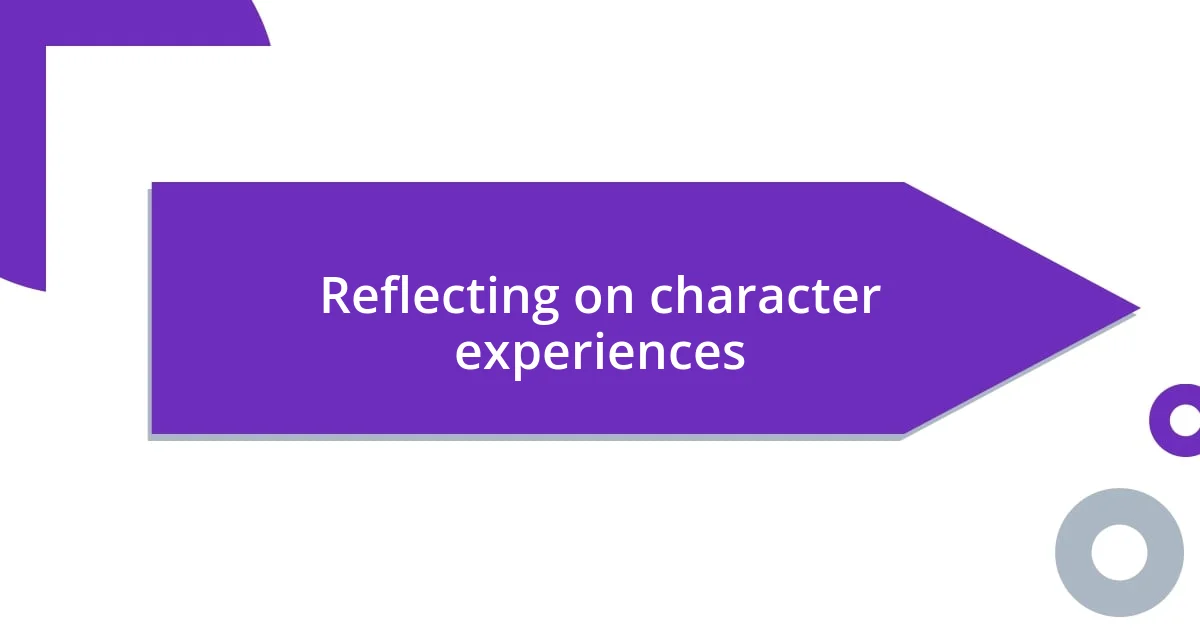
Reflecting on character experiences
Reflecting on a character’s experiences often feels like holding up a mirror to my own life. There have been times when I’ve read about a character facing rejection, and it takes me back to a moment I felt overlooked. Those feelings of isolation often bubble to the surface, inviting me to reconnect with my own emotional landscape. Isn’t it fascinating how a fictional experience can resonate so profoundly with our reality?
Sometimes, I find myself contemplating the transformations characters undergo, particularly in moments of vulnerability. I recall analyzing a character who wrestled with their identity in a challenging environment. It hit me hard when I realized how bravely they faced their fears, which made me question whether I approach my own challenges with that same courage. Can my understanding of their journey influence how I confront my own insecurities? This kind of reflection not only deepens my empathy but also inspires personal growth.
When I dive deeper into their relationships, I often uncover the complexities of human connection. Recently, I observed a character struggling to forgive a loved one, and I thought about my own experiences with forgiveness. How often do we cling to past hurt, letting it cloud our capacity to heal? This analysis not only broadens my understanding of others but also sheds light on the importance of compassion in my own relationships. It’s a continuous journey of reflection, ultimately guiding me toward greater empathy.
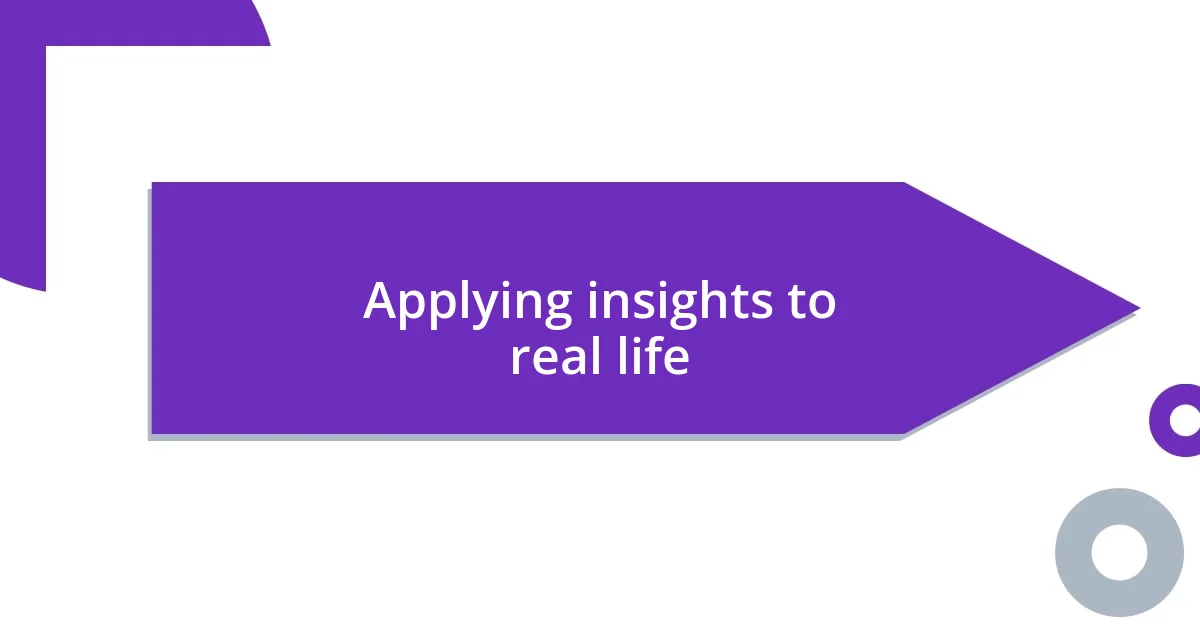
Applying insights to real life
Applying insights from character analysis into real life has been a transformative experience for me. For instance, during one particularly poignant read, I encountered a character who battled feelings of inadequacy. It mirrored a time in my life when I questioned my self-worth. In that moment, I realized how powerful it is to acknowledge those feelings instead of burying them. Have you ever felt that cathartic release when you connect deeply with a character? It’s as if their journey becomes a pathway to your own healing.
One day, I found myself reflecting on a character’s journey toward forgiveness. They wrestled with letting go of past grievances, and it made me think about a falling out I had with a friend. Instead of just dismissing it, I began to explore my own emotions around forgiveness and whether I was holding on to resentment. It struck me: understanding their struggle helped me confront my own. Isn’t it interesting how one character’s fictional journey can prompt such real-life introspection and growth?
As I sit with those insights, I often think about empathy as a practice rather than just a feeling. A character I analyzed once bravely faced their fears, and I wondered: how often do I shy away from mine? This reflection drives me to engage more openly with others, asking questions that dig deeper than surface-level interactions. I invite you to consider this: how can our everyday conversations shift when we infuse them with the understanding we gain from characters? I’ve found that each discussion becomes richer and more meaningful, drawing us closer and fostering a genuine connection.
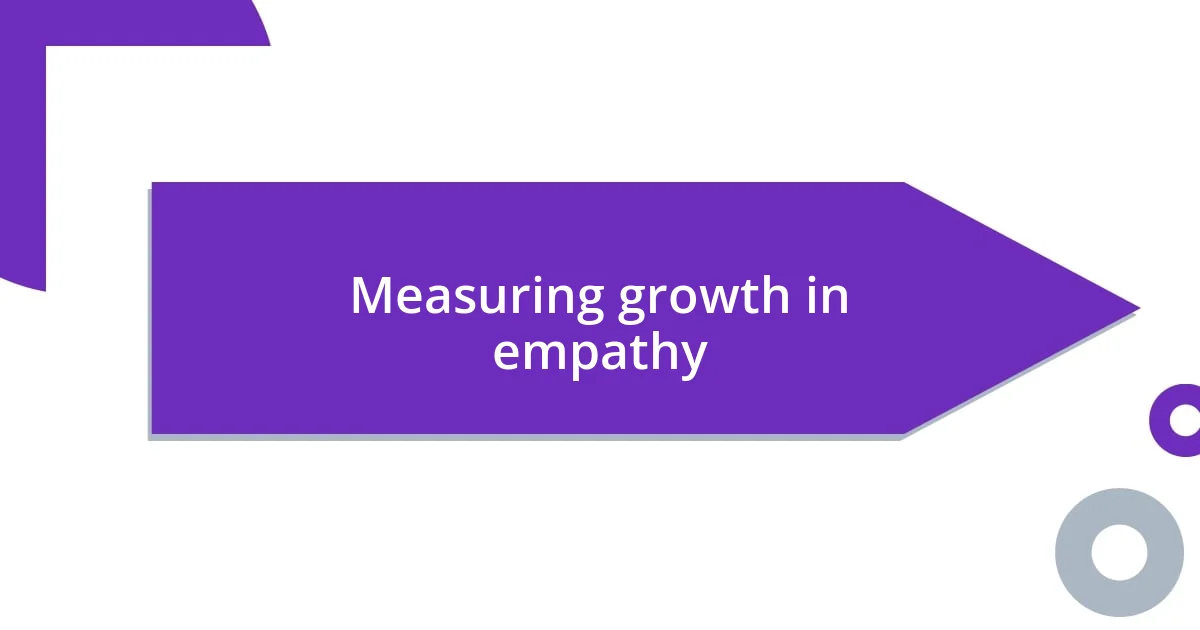
Measuring growth in empathy
Measuring growth in empathy can sometimes feel like an abstract concept, but I’ve noticed it manifests in subtle yet telling ways. For example, after delving into characters who faced significant loss, I’ve felt a shift in my reactions to friends who share their own grief. I’ve started to listen more intently, noticing how my heart genuinely aches with theirs. Have you ever felt that transformation from simply hearing someone’s story to feeling it in your bones? It’s enlightening.
When I reflect on my conversations, I realize that empathy growth isn’t instantaneous. It’s revealed in my ability to hold space for others without rushing to offer solutions. Recently, a friend opened up about a struggle at work, and instead of jumping in with advice, I focused on validating her feelings. I found myself thinking, “What if her frustration is a window into a broader experience?” This shift in perspective was a clear sign that my empathy had deepened.
I often track my empathy growth by assessing my emotional responses. After exploring a character’s journey through hardship, I notice that I’m more likely to recognize the similar struggles of those around me. Last week, I encountered a colleague grappling with anxiety about an upcoming presentation. Reflecting on a character who faced a similar situation, I reached out to offer support rather than brushing past it as I might have before. It’s in those moments that I realize: empathy truly grows when we act on our understanding. Wouldn’t you agree that taking action based on awareness is a pivotal part of this journey?










